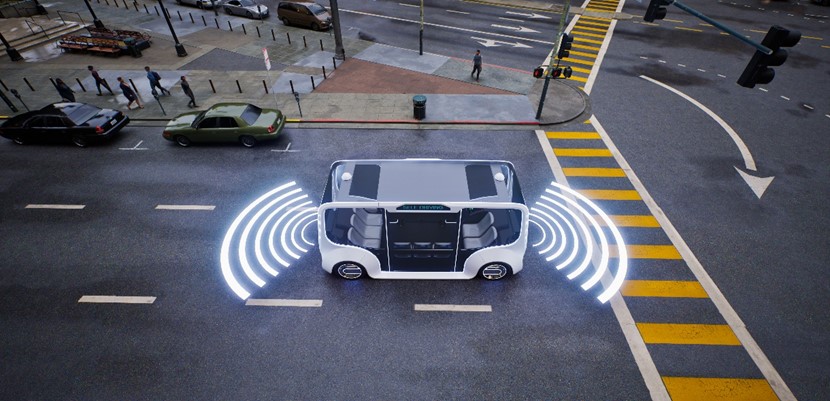MSU REU Program Continues to Explore Intersection of Autonomous Driving and Social Sciences
MSU is in the midst of its third year of its Research Experience for Undergraduates (REU) program, offering a new group of future thought leaders the opportunity to have an active and meaningful role in a series of multi-disciplinary projects that address both the technical and societal aspects of autonomous vehicles (AVs). The three-year REU program is funded by an almost $350,000 grant from the National Science Foundation and aims to train students in sociomobility, an area of research at the intersection of engineering and social sciences.
This summer, 15 students from across the country are participating in the program, working with teams of sociomobility researchers on original, interdisciplinary and collaborative research projects that are critical to the future of autonomous driving. Teams are structured to include at least one faculty or student member with a background in engineering and another with a background in social sciences.
Five sociomobility-related topics are being investigated this summer, as determined collaboratively by a diverse range of public and private industry stakeholders. These five topics include:
Forecasting Impacts of Forward-Collision Warning/Automating Emergency Braking Systems
Highway systems are designed based on assumptions related to driver behavior (e.g., reaction time and deceleration rate). The introduction of technologies like automatic emergency braking systems is anticipated to have a significant impact on these assumptions and, once widely adopted, result in more flexibility in design practices. This project is leveraging performance data and market penetration rate estimates to forecast the impacts of such systems..
- Faculty Mentors: Pete Savolainen and Timothy Gates
- Students: Derrick Hill (Illinois Institute of Technology), Alejandra Meza (University of San Francisco) and Prem Shah (Idaho State University)

Assessing Barriers to Accessibility of Automated Vehicles
Barriers to accessibility in public settings lead to fewer trips outside the home for people with disabilities, impacting their ability to attend doctor’s appointments, get groceries, maintain employment and more. This project aims to document and analyze the types of barriers that exist when traveling public streets and sidewalks, the severity of their impacts on accessibility, and how these impacts differ for people with various disabilities.
- Faculty Mentors: Tamara Reid-Bush and Justin Scott
- Students: Claire Dahlin (Taylor University), Grace Oswald (University of Alabama in Huntsville) and Wanda Quan (University of San Francisco)
Health Impacts of Automated Vehicles
Active transportation has been the primary focus for studies involving health outcomes and physical activity for different transportation modes, with this conversation recently expanding to include shared mobility and micromobility. To this point, most Connected and Automated Vehicle (CAV) studies have looked at perceptions and the willingness to ride these modes of transportation to predict adoption patterns for both private and public transportation options. However, the potential health impacts of the widespread adoption of AVs is underrepresented in research. This project is investigating the perceptions of vulnerable population groups (e.g., seniors and children) on AV adoption and the potential impacts on health in the forms of physical activity, mental stress and physical stress.
- Faculty Mentors: Zeenat Kotval-Karamchandani
- Students: Lyla Boatman (Louisiana State University), Adare Cario (University of Michigan) and Maria Costa (Georgia Institute of Technology)
Examining Self-Driving Vehicles through the Lens of Environmental Justice
Studies show that traffic-related pollutants can cause adverse health impacts to people who live near major roadways, often disproportionately impacting marginalized communities, raising important concerns about environmental injustice. Switching to autonomous cars may help solve this issue as many self-driving vehicles will be electric and do not emit pollutants. However, emissions from power plants used to generate the power for these solutions pose a threat to those who live nearby. This project will involve a life-cycle cost analysis to compare emissions tradeoffs between self-driving and traditional vehicles.
- Faculty Mentors: Annick Anctil and Kaisen Lin
- Students: Shannon Collins (Virginia Tech) Ashley Jung (University of Southern California) and Kimberly Suarez (West Chester University)
AV/EV Disruptions Affecting the Environment, Safety and Social Justice
Autonomous vehicles can provide considerable benefits, however, they also pose some notable environmental and public safety concerns as well as social justice implications that can exclude some groups or neighborhoods. This project combines an understanding of autonomous and electric vehicles, how they affect people and places, and costs and benefits associated with the environment, personal safety and economic opportunity considered through the lens of social justice.
- Faculty Mentor: Mark Wilson
- Students: David Burean (Purdue University), Isaac Gabriel (West Chester University) and Kendrick Xuan (Georgia Institute of Technology)
The goal of the REU program is to train future thought leaders and provide research experiences leading to technological advances with potential for near-immediate adoption by public agencies and private industry as well as use the scientific findings to help shape emerging policies and programs. The 2023 program began at the end of May and will conclude on July 28th. For more information on MSU’s sociomobility program and past REU projects, click here.

